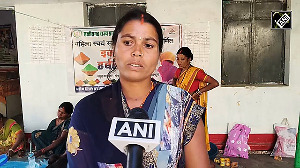The drinking water in many parts of Bangladesh and the neighboring Indian state of West Bengal is contaminated, most notably with arsenic, Dr Sarkar said.
He said the team found that 28 million people in Bangladesh were drinking water with arsenic concentrations greater than the national standard. Arsenic contamination causes bladder, liver, and lung cancer, among other diseases.
"The method for testing water that is being used now is very expensive," he said. "What we have is a laboratory method which uses simple equipment for testing the water quality."
The findings have been published online ahead of being printed in the journal Environmental Health Perspective. The study was conducted over a three year period when the scientists collected groundwater samples from 67 tube wells in western Bangladesh which were sent to Dubai, France and the United States to be tested. ![]() The tests found every toxic element above the World Health Organization guidelines. The water in 96 percent of the wells exceeded WHO guidelines for at least one toxic substance like arsenic, manganese, uranium, lead, nickel, chromium, boron and barium. Of the 67 percent of tube wells with safe levels of arsenic, 87 percent had unsafe levels of manganese and 64 percent had unsafe levels of uranium.
The tests found every toxic element above the World Health Organization guidelines. The water in 96 percent of the wells exceeded WHO guidelines for at least one toxic substance like arsenic, manganese, uranium, lead, nickel, chromium, boron and barium. Of the 67 percent of tube wells with safe levels of arsenic, 87 percent had unsafe levels of manganese and 64 percent had unsafe levels of uranium.
"While not all of the tube wells showed dangerous concentrations of arsenic, over 60 million people are drinking unsafe water," Sarkar said. "Public education has raised awareness of the link between arsenic poisoning and many types of cancer, but the dangers of chronic ingestion of manganese, which is associated with neurological damage, including Parkinsonian disorders, and chronic uranium ingestion, linked to kidney and bone damage, remain unclear. As life expectancy continues to rise in Bangladesh, the prevalence of chronic disorders is likely to grow," the report said
Until a long-term sustainable solution can be found, the scientists have proposed a three-step testing strategy. Sarkar also said that majority of the people from western Bangladesh are willing to share safe tube wells with their neighbors.
Dr Sarkar and his team's study was supported by Better Life Laboratories, Norwich University, the Bangladesh Association for Needy Peoples Improvement, the Universite de Borbeux in France and the SickKids Foundation.






 © 2025
© 2025